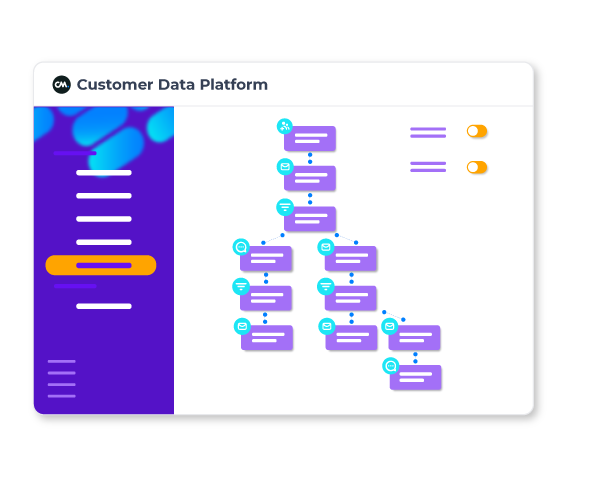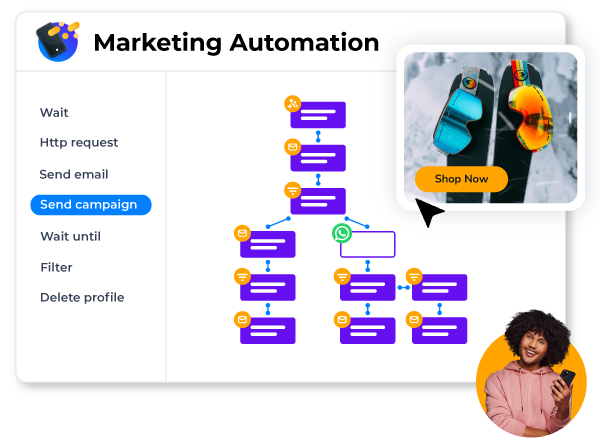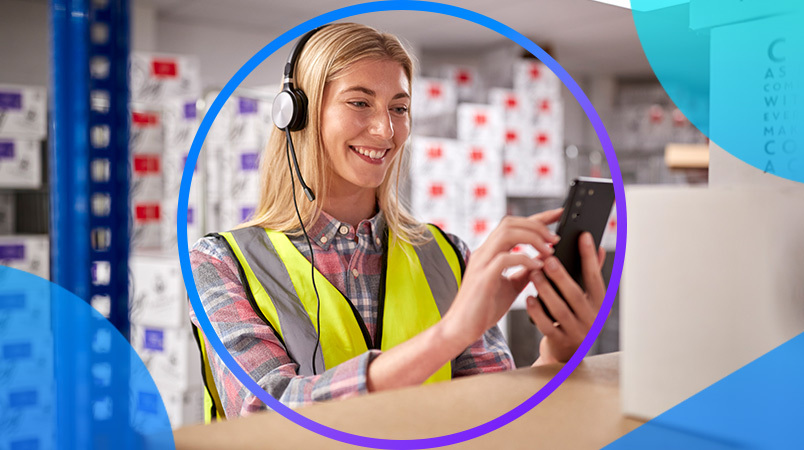
Change the way you approach marketing and centralise your customer data within our Customer Data Platform. Connect multiple data sources into one unified customer profile giving you real-time insights into your customer's behaviour.
Watch demo videoGet in touchTake it from the experts
recipients are more likely to click on emails from segmented campaigns than non-segmented campaigns.
marketing automation users saw an increase in the number of leads using marketing automation software.
marketing automation users had an increase in conversions using marketing automation software.
Customer Data is often fragmented and siloed in different software systems. As a result, you cannot exploit the data to its full potential. Our CDP unlocks your data and solves this problem.
We unify your customer data into 360˚ customer profiles, regardless of how or where your data is stored.
Benefit from the power of unlimited data sources.
Integrate data via Webhooks, API integrations, or CSV imports.
Unify your customer data into 360˚ customer profiles.


Once your customer data is fully integrated into the Mobile Marketing Cloud, you can create segments. These segments can be based on any rules and criteria you like.
The segments can include channel engagement, user location, birthdays, purchase history, web behaviour or any other events you can think of.
Segment based on behavioural targeting.
Segment based on events or demographics.
Filter segments by permissions to ensure POPIA compliance.
One size does not fit all. Customers expect personalised offerings catered to their preferences. You can do this by collecting data events of their interactions.
And by personalising your messaging based on their behavior. These processes can be automated and scaled by using real-time smart segments.
Know what your customer wants.
Personalize customer experiences.
Use real-time smart segments.
Once you know what your customer wants, you now need to reach them at the right moment and place.
The Mobile Marketing Cloud enables you with all the campaign management tools to create omnichannel customer journeys.
Start omnichannel conversations via Email, SMS, or WhatsApp.
Automate with personal workflows.
Use advanced campaign management.
Create automated sign-up journeys that give your customers a wow feeling from the first point of contact.
Know who your customers are and what they want by collecting their data through giveaways, QR codes and registration forms.
Know why your customers are inactive and reactivate them with personalised messages through their preferred channel.
Create personalised offers for special moments such as birthdays and anniversaries, that customers will never forget.
Integrate the CM.com Mobile Marketing Cloud in your organisation and use it with success. Watch our demo video to see our platform in action.
Watch demo videoGet in touchIn recent years, SMS integration has played a pivotal role in transforming the Black Friday shopping experience. Both retailers and consumers have wholeheartedly embraced SMS as a powerful tool for communicating promotions, exclusive offers, and time-sensitive alerts.
The impact of social media on leisure and travel is undeniable. Platforms like Instagram and Facebook have transformed how people experience and plan their journeys. They serve as hubs for sharing photos, videos, travel tips, and reviews, essential tools for travellers worldwide.
What’s so great about sports is that it connects all kinds of people. On the other hand, knowing no two sports fans are alike makes it challenging for sports organisations to address different fan segments. The organisation behind the Formula 1 Heineken Dutch Grand Prix acknowledged this challenge and didn’t just pack the CM.com Circuit Zandvoort with their best fans. Instead, they’ve managed to enhance their fan experience right at their first racing event in 35 years. What’s more, they keep improving fan engagement year on year. Curious to know how? We’ll share five insider tips on how the Dutch Grand Prix enhanced its fan engagement before, during, and after the race.
In today's digital landscape, customer engagement is increasingly shifting towards social media platforms. This shift is well-founded, as personalised messaging on the messaging apps preferred by your customers can greatly enhance your brand awareness. With the introduction of Instagram's new Marketing Messages feature, you now have a powerful marketing tool at your disposal to increase your visibility where your customers are and re-engage them effectively, ultimately boosting your conversion rates.
You’ve heard about SMS marketing campaigns for consumers, but what about SMS marketing for B2B? B2B text messaging is an effective way to communicate with your business clientele, enabling you to build relationships with decision-makers and offer information that helps them make buying decisions.
The adage that time is money has never been truer than it is today - and especially for those brave souls in transport and logistics. Razor-thin profit margins and almost impossible deadlines make this a particularly challenging industry!
Look at most definitions of conversational marketing, and it’s not clear what all the excitement’s about. “Engaging customers through dialogue”, “interacting with people via real-time”, “two-way communication”, “putting the focus on interactions using social media messaging channels”. Isn’t that what marketers have been doing for years?
In an age of mass marketing, as well as constant TV, internet and email advertising, it’s safe to say that sales periods can be something of an overwhelming experience for consumers around the world. Inundated with information from companies, people could be forgiven for wanting to switch off their phones, radios and televisions and ignore all forms of marketing until the sales period is all over. As an eCommerce owner, you should always be looking to avoid this by diversifying your marketing strategy in a way that suits your customers needs and sensibilities.
WhatsApp newsletters are messages that can be sent from a brand's WhatsApp business account to a specific audience of customers with information that's relevant to them. You can send people special offers, exclusive discounts, and new product announcements. You can also personalise these offers based on special events like holidays and birthdays, or annual promotions like Valentine's and Easter.
Select a region to show relevant information. This may change the language.











